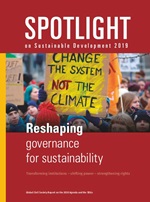Published on Fri, 2020-03-27 08:50
The United Nations Secretary-General Antonio Guterres on 25 March launched a US$2 billion coordinated global humanitarian response plan to fund the fight against COVID-19 across South America, Africa, the Middle East and Asia. The launch was held virtually in UN headquarters in New York, with the Secretary-General being joined by the UN Under-Secretary-General for Humanitarian Affairs Mark Lowcock, WHO Director-General Dr. Tedros Adhanom Ghebreyesus, and UNICEF Executive Director Henrietta Fore. According to the UN, COVID-19 has killed more than 16,000 people worldwide, and there are nearly 400,000 reported cases. |
Published on Sat, 2020-03-21 10:14
The Covid-19 pandemia is a global health crisis (with major financial and economic consequences) but international organizations, starting with the World Health Organization “are still insufficiently funded to respond quickly to the emergence of dangerous diseases - and to prevent them from spreading to global pandemics” argue Jens Martens and Bodo Ellmers, from Global Policy Forum in a briefing paper published last March 18. People in most Global South countries are likely to suffer its impact even more and therefore “in order to prevent the corona crisis from becoming a global development crisis, solidarity must not end at national borders.” |
Published on Fri, 2020-03-20 12:13
ECLAC’s Executive Secretary, Alicia Bárcena, warned that the region’s economies will suffer the pandemic’s negative consequences via numerous channels. The Executive Secretary of the Economic Commission for Latin America and the Caribbean (ECLAC), Alicia Bárcena, warned today that the Coronavirus (COVID-19) pandemic will have devastating effects on the global economy that will certainly be more intense than and distinct from those felt during the 2008-2009 global financial crisis, adding that Latin American and Caribbean countries will not be spared since they will be affected through numerous channels. |
Published on Thu, 2020-03-19 23:59
Cyprus undergoes a trade-off between urgent responses to the economic and financial crisis and its sustainable development commitments. As a member of the European Union, Cyprus should be implementing the concepts of Policy Coherence for Development (PCD) and Policy Coherence for Sustainable Development (PCSD), yet neither of these is mentioned in the country’s official Voluntary National Review, which in fact omits the whole of SDG 17 (on implementation). |
Published on Thu, 2020-03-19 23:45
SDG 6, Ensure availability and sustainable management of water and sanitation for all, represents one of the easiest – and most fundamental – parts of the 2030 Agenda to achieve. Dynamics of power and inequality shape access to water, sanitation and hygiene (WASH) and other basic services, both in terms of tangible metrics (income, nearness and type of family toilet or water source) and because of the unequal distribution of influence over decision-making - the gulf between whose rights and voices count and whose do not. Raising the political leverage of communities facing discrimination in infrastructure and service provision is key in changing the power relationships between users and providers. The preconditions for universal access to WASH at national level must be matched by commitments at international level: to significantly increase official development assistance (ODA), restructure debt, curb illicit financial flows and stimulate new sources of international public assistance through democratic institutions. |
SUSCRIBE TO OUR NEWSLETTER







